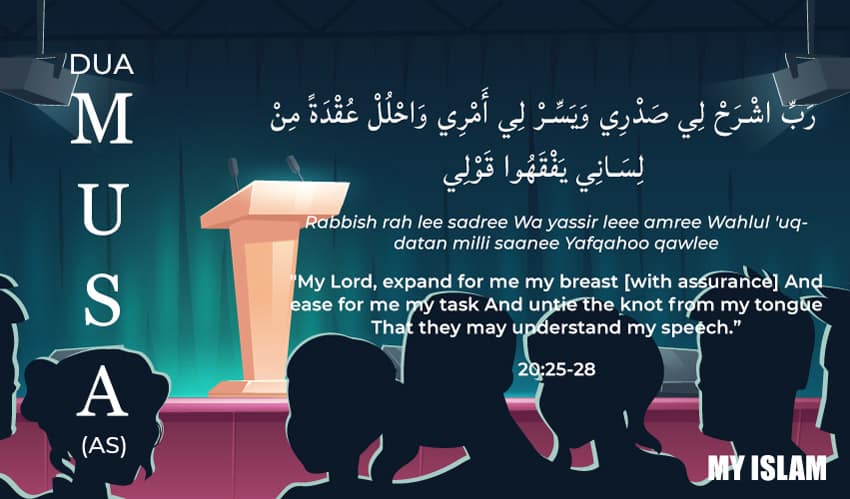
رَبِّ اشْرَحْ لِي صَدْرِي وَيَسِّرْ لِي أَمْرِي وَاحْلُلْ عُقْدَةً مِنْ لِسَانِي يَفْقَهُوا قَوْلِي
Rabbish rah lee sadree Wa yassir leee amree Wahlul ‘uqdatan milli saanee Yafqahoo qawlee
“My Lord, expand for me my breast [with assurance] And ease for me my task And untie the knot from my tongue That they may understand my speech.”
Surah Ta-Ha Ayat 25-28
Key Takeaways:
- Public speaking is difficult but if you’re able to recognize and label the emotion you are feeling as you experience it, it can take away some of its power and hold over you. It’s similar to the fact that if you can catch yourself getting angry and say, “Wow, I am in a state of anger” it can provide you with enough distance to rationalize whether that anger is justified. Sometimes we need to take a deep breath, stand tall, and understand that whatever happens, Allah (swt) has created you capable of handling it, “Allah does not burden any soul with more than it can bear” (2:286). Develop more trust in your ability to handle whatever comes your way.
- We can see Musa (as) mental fortitude when he says, “And ease for me my task”. There is no doubt or excuses in his conviction in what needs to be done as it will be done. He just asks for Allah’s help and guidance through it.
- Sometimes when we don’t want to do something, we look for excuses, we look for exits, hoping some external force comes to derail the plan so we’re personally let off the hook. Musa (as) doesn’t do this, in his mind, his fate is already sealed, a promise within himself has been made and will be acted upon.
Allah entrusted Musa (as) with his message and commanded him to do the unthinkable, “Go to Firaawn; (Pharaoh) Indeed, he has transgressed.” (20:24)
Imagined being tasked with telling the tyrannical King of Egypt that he has done wrong. A person you know to have a history of torturing and enslaving people.
Musa (as) does not dispute the responsibility that Allah had commanded of him. He accepts his role gracefully, shows complete trust in Allah (swt). But still, his job isn’t an easy one. There is some debate as to whether Musa (as) suffered from a childhood speech impediment. The prophet’s (may peace be upon them) were not born with any physical infallibility but they are human like you and me and can suffer from physical trauma.
Some Tafsir works and commentators relate a story of how Musa (as) as a child pulled hair from Firaawn’s beard. This act threatened Firaawn as he was paranoid that an Israelite may overthrow him one day (this is why he later ordered all newborns to be killed in Surah Baqarah ayat 49) He threatened to put Musa (as) to death but Asiyah (Firaawn wife, and the adoptive mother of Musa (as)) protected him saying he doesn’t know the difference between right and wrong. So, to test Musa (as) he put a fiery coal and ruby before him, if he could tell the difference between things that look the same he would sentence Musa (as) to death. With the objects in front of him, Jibreel came down and guided his hand to grab the fiery stone. Musa (as) then placed the coal into his mouth burning his tongue and impeding his speech. This was enough to convince Firaawn that Musa (as) couldn’t discriminate from right from wrong and it saved his life.
Pharaoh proclaimed among his people: “My people, do I not have dominion over Egypt, and are these streams not flowing beneath me? Can’t you see? Or am I [not] better than this one [i.e., Moses] who is insignificant and hardly makes himself clear? (Surah Zukhruf ayat 51-52)
Other scholars have argued that Musa (as) never suffered from a speech impediment and that the verse above just refers to Musa (as) as being difficult to understand or his talks to be confusing.
Either way – he feels the heavy burden of the task to confront Firaawn and is visibly anxious. At that moment he turns to Allah subhanahu wa ta’ala and makes this du’a asking for the ability to be confident in his speech.
In this supplication, Musa (as) says, Rabbish rahli sadri, this translates to “My lord, my creator, open my chest”.
This does not literally mean to clear one’s chest but rather is an expression meaning to give assurance or confidence. To settle my fears, remove the emotions, and calm the nerves.
He then continues, wa yassirli amri meaning “And ease for me my task”.
We can see how strong-minded Musa (as) is, there is no doubt or excuses, his conviction in what needs to be done will be done, he is just asking for Allah’s help guide him through it.
Sometimes when we don’t want to do something, we look for excuses, we look for exits, hoping some external force comes to derail the plan so we’re personally let off the hook. Musa (as) doesn’t do this, in his mind, his fate is already sealed, a promise within himself has been made and will be acted upon.
Some things just need to be done and we need to have the courage to do them.
The beauty in this du’a is, it asks Allah for ease in the things we must do. It is in Allah’s control whether something will be easy or hard, so we turn to him and ask him alone to make it easy for us. It can become easy in two ways, (1) is we become more skillful through practice and repetition so the task no longer feels difficult, or (2) Allah (swt) makes it so the task wasn’t as challenging as we presumed it would be.
In the next part of this du’a Musa (as) says, wah lul uqdatan min lisaani, “And untie the knot from my tongue”.
Here Musa (as) recognizes that in the moments where he will be in front of Firaawn, he may feel uneasy. In those moments, your adrenaline levels spikes, and you may stumble or forget what you had planned to say.
Public speaking is difficult but if you’re able to recognize and label the emotion you are feeling as you experience it, it can take away some of its power and hold over you. I believe this part of the du’a is a self-reflection on the part of Musa (as). It’s similar to the fact that if you can catch yourself getting angry and say, “Wow, I am in a state of anger” it provides you with enough distance to rationalize whether that anger is justified. Sometimes we just need to take a deep breath, stand tall, and know whatever happens that Allah (swt) has created you capable of handling it, “Allah does not burden any soul with more than it can bear” (2:286). Develop more trust in your ability to handle whatever comes your way. You don’t face the same risks Musa (as) endured and if you ask yourself what’s the worse thing that could happen, you’ll often realize there’s nothing really at stake.
In the final section of this du’a Musa (as) says, yaf kahu kauli, meaning “That they may understand my speech.” Musa (as) prays to Allah that he may communicate and express himself clearly and freely causing those who hear his talk to leave with no doubt of the truth.
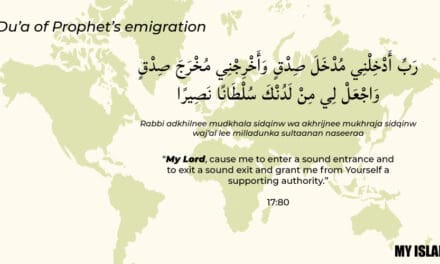
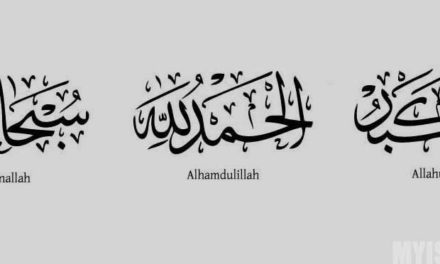
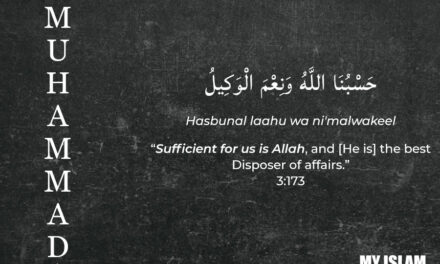
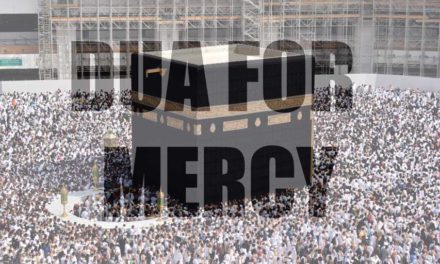
WILL YOU PLEASE UPLOAD A BLOG ABOUT 99 NAMES OF MUHAMMAD SAW (PBUH)
Masha llah